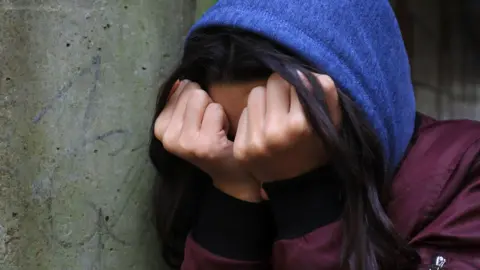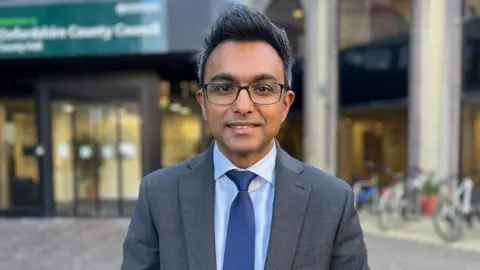Children's mental health 'worse in deprived areas'
 PA Media
PA MediaChildren living in poorer areas of Oxfordshire are significantly more likely to suffer from mental health problems, a new report has found.
Oxfordshire County Council's director of public health presented an overview of the mental health and wellbeing of local children and young people to councillors on Tuesday.
Ansaf Azhar told the BBC his report showed mental health issues were becoming a barrier to some children reaching their full potential.
At the meeting, councillors voted to "take every opportunity to support actions and initiatives" raised by the report.
Speaking in the chamber, Nathan Ley, cabinet member for public health, inequalities and community safety, said: "If we want a fairer and healthier and more prosperous county we have to act now to support our young people and their mental health, not just for their sake but the future of our workforce and our communities."

The report found "striking" inequalities when it came to children's mental health and wellbeing, using some data from the 2023 OxWell School Survey.
About a quarter of children aged eight to 16 with mental health problems had a parent unable to afford out-of-school activities, it said.
"More deprived areas" such as Greater Leys had approximately six-and-a-half times the rate of self-harm as north central Oxford.
It said rising costs of living, where the cost of housing is high relative to incomes, played a role.
It also highlighted how "harmful content", "harassment" and "cyberbullying" on social media had "severe detrimental effects", linked with depression and anxiety.
Other findings include:
- Proportion of children receiving support in school for a special educational need steadily rising, with growth outpacing national trend
- About 11% of children referred to secondary mental health services, one of the highest rates in the south east of England
- Autism significantly higher compared to national average
- Oxfordshire ranking in the lowest 25% nationally for educational attainment for disadvantaged children in early years development, Key Stage 1, Key Stage 2, and Key Stage 4

Key recommendations include:
- Addressing wider factors through "meaningful partnerships" with the NHS, county and district councils, universities, businesses, educational institutions and the voluntary sector
- Prioritising opportunity, activity, independence and community through community-based arts and sporting clubs, as opposed to children spending excessive time on social media
- Prioritising early and effective intervention by developing senior mental health leads at schools, and improving mental health first aid training for parents, caregivers and professionals
Mr Azhar said young people needed to feel more "empowered".
"Our schools and our early years teams are doing a fantastic job," he added.
"What we need to do is to build on that and expand further, and make it clear that there are plenty of interventions available... and if we do that we can give them a better opportunity to manage their own conditions."
Dr Emma Soneson, who worked on the original survey, told the BBC: "When people think about Oxfordshire they think of this magnificent university town and forget about a lot of the inequalities."
She added: "Tackling inequalities is really one of the foremost things that we should be doing, and which the report sets out a really clear action plan for."
You can follow BBC Oxfordshire on Facebook, X, or Instagram.
